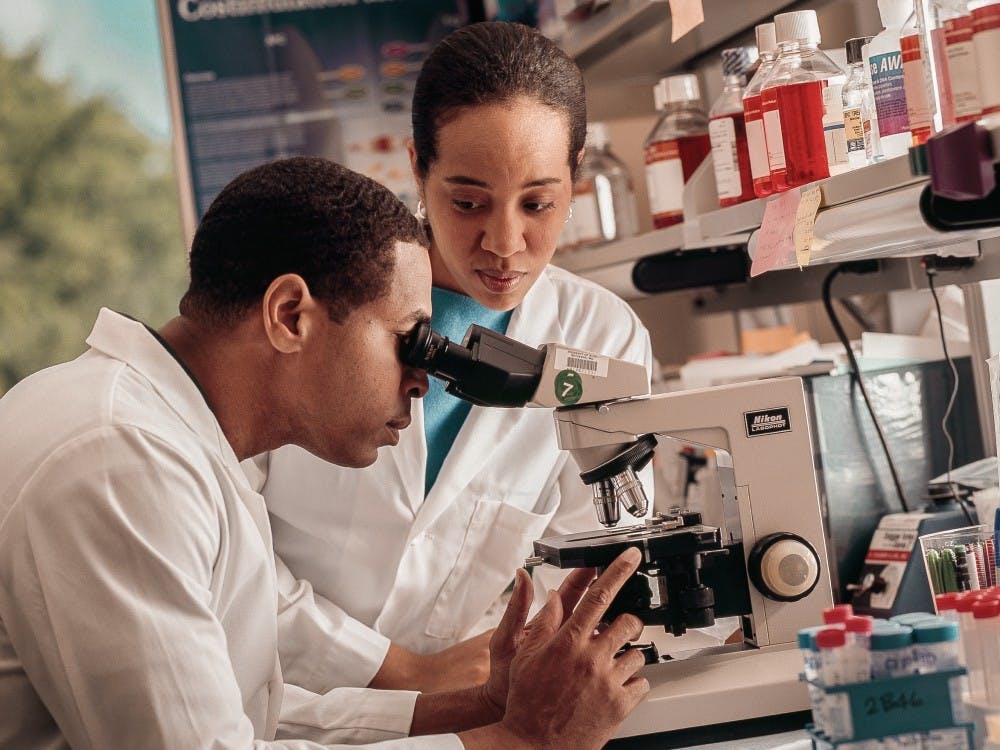With on-campus activities driven to a halt, many researchers in Duke’s scientific labs are trying to adapt to not having access to their labs.
Vice President for Research Lawrence Carin sent an email to all lab personnel March 17 indicating that lab research must cease immediately, with exceptions for clinical research studies with human subjects and research “towards vaccination against, treatment or diagnosis of COVID-19.”
The implications of this directive on researchers in the past month has varied wildly, with some individuals still coming in and out of the lab while others are restricted to work that can be done from home.
Clare Smith, assistant professor of molecular genetics and microbiology, is part of the former group.
Her lab, which started up in December, primarily investigates the genetic basis of susceptibility to infectious diseases and uses this knowledge to design interventions, such as vaccines. Smith’s work with Mycobacterium tuberculosis takes place in a high containment lab setting—her lab has a suite in Duke’s Regional Biocontainment Lab. The approaches her lab takes can be broadly applied to other pathogens, she explains, which is how the Smith Lab became an important collaborator in understanding COVID-19.
The Smith Lab has since joined forces with the Heaton Lab, which is focused on developing tools and platforms to understand viral infections, with the intent to collaborate in their work against COVID-19.
“This is going to take a concerted, collaborative research effort to overcome this monumental public health challenge. We have the opportunity to be creative in combining our research experiences and approaches to meet this challenge,” Smith wrote in an email.
Carin’s directive emphasized that research can continue, with a focus on writing, analyses and computations that may be done off-campus. He added that research group meetings should continue virtually—a statement which has become reality for those researchers whose work is now fully from home.
Mariah Hoye, a postdoctoral fellow in the Silver Lab, shared that her time at home is mostly spent performing data analysis, writing grants and finishing review articles. While her experiments—many of which required mice and cell lines—have been put on pause, Hoye still made note of a silver lining.
“I think one positive of all of this is that it’s really a forced opportunity to learn new things,” she said, “I know a lot of people are trying to learn how to code, or trying to learn how to use different software.”
Lawrence David, assistant professor in molecular genetics and microbiology and principal investigator of the David Lab, shared similar sentiments. While some elements in his daily routine have stayed the same, including paper editing and working on grants, other things have changed completely.
“I no longer get to meet in person with my colleagues and lab members, which is something I have always enjoyed. It takes a lot more time now to email people instead of getting to knock on their door and chat,” he shared in an email.
Because his lab studies the human microbiota, experiments which require human trials, these efforts have for the time being been halted.
David said that on one hand, the lab can continue to make progress on writing papers and grants and analyzing data. However, he is unsure about the effects of recent events on the longer term academic scientific enterprise.
Other researchers are experiencing similar uncertainty, especially in regards to grants and payment, both of which are dependent on research getting completed.
“For now we’re all being paid, but research is an essential component of what we do, and if we can’t do research, and if this goes on for months and months, are we going to continue to be paid? I don’t know. I hope so, I think so, but it’s unclear,” Hoye said.
Hoye also emphasized that research at home is not sustainable long-term, noting that one to two months is definitely a setback but manageable since everyone can find enough work to do for a month. She added that when it starts getting to two to three months however, she expects we’ll start to see a “really dramatic impact” on research activity.
Get The Chronicle straight to your inbox
Signup for our weekly newsletter. Cancel at any time.

Preetha Ramachandran is a Trinity senior and diversity, equity and inclusion coordinator for The Chronicle's 118th volume. She was previously senior editor for Volume 117.

